外研版(2019)必修第二册 Unit 3 On the Move 非谓语动词1做主表宾课件(37张)
文档属性
| 名称 | 外研版(2019)必修第二册 Unit 3 On the Move 非谓语动词1做主表宾课件(37张) |  | |
| 格式 | zip | ||
| 文件大小 | 525.3KB | ||
| 资源类型 | 教案 | ||
| 版本资源 | 外研版(2019) | ||
| 科目 | 英语 | ||
| 更新时间 | 2022-07-28 16:51:00 | ||
图片预览

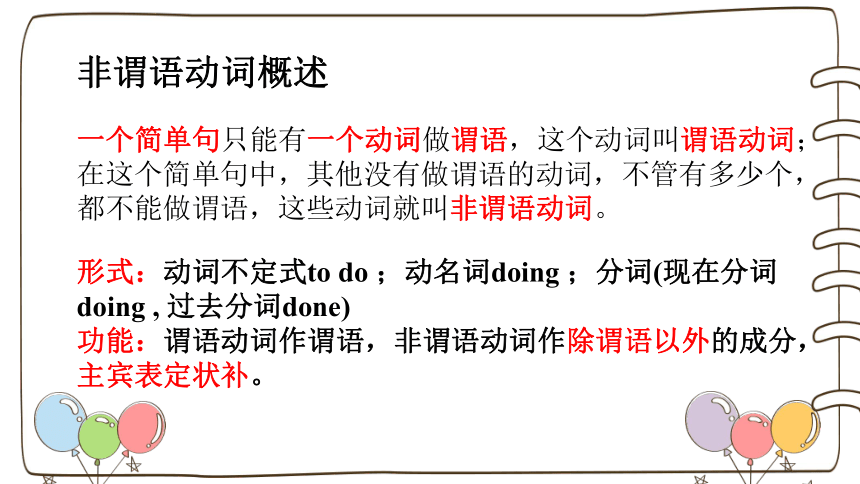
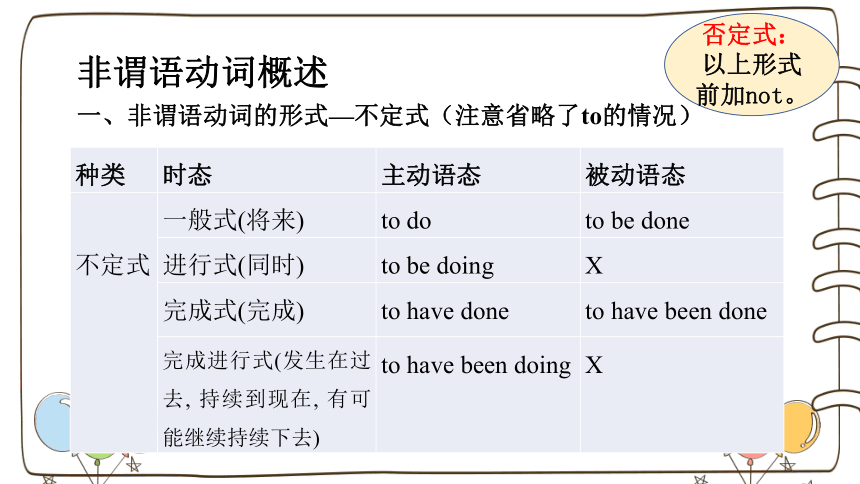
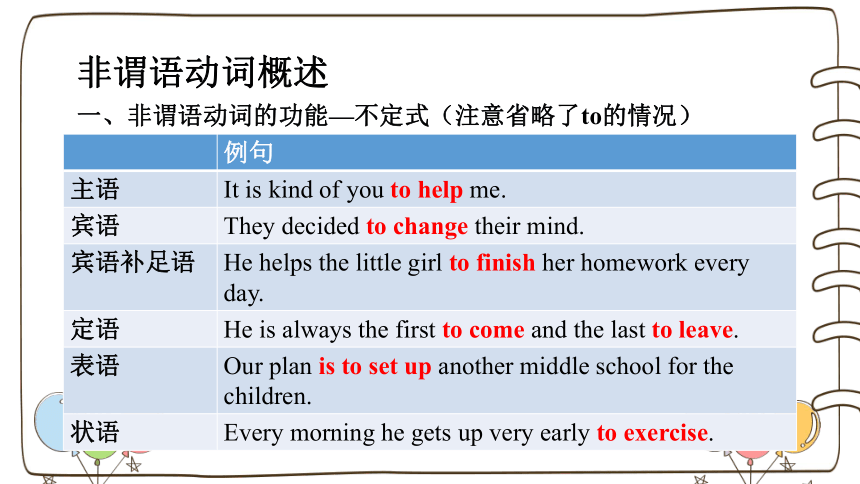
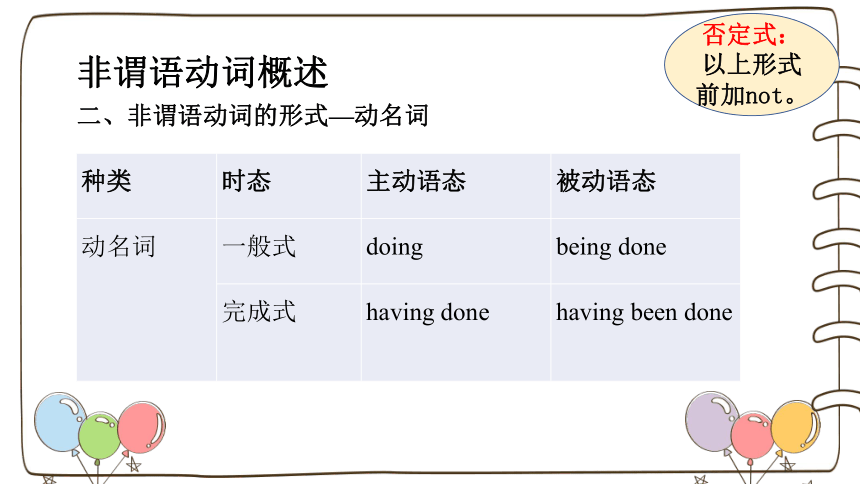
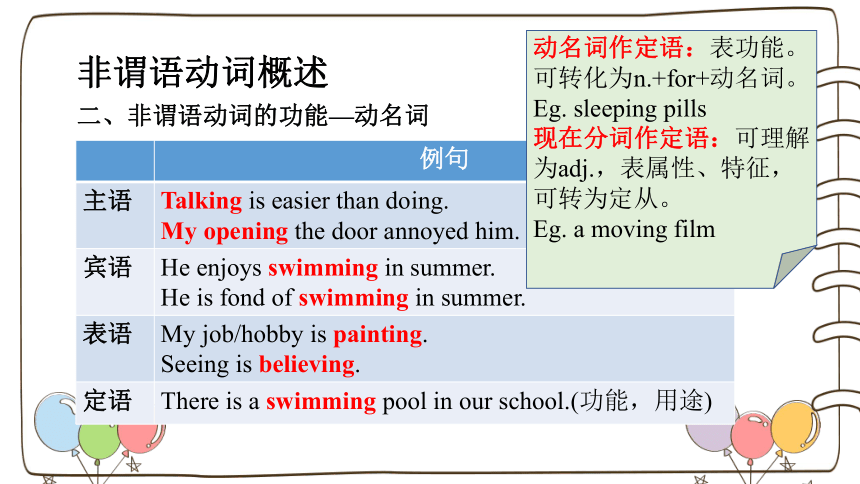
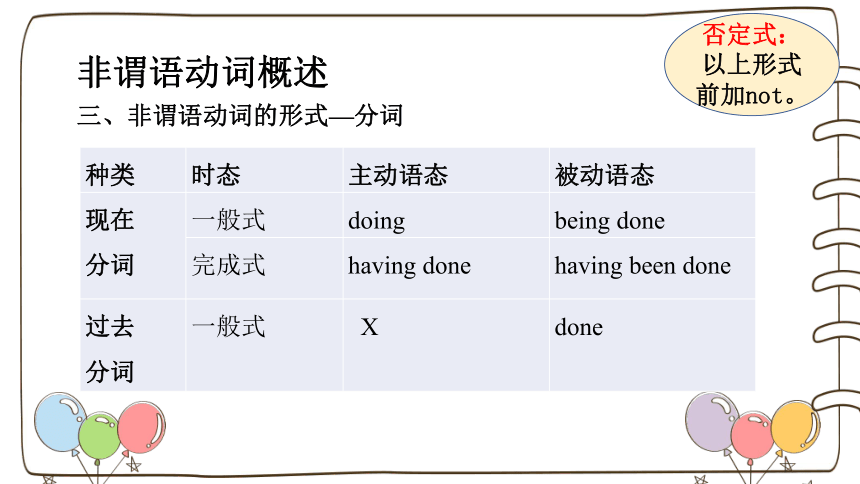
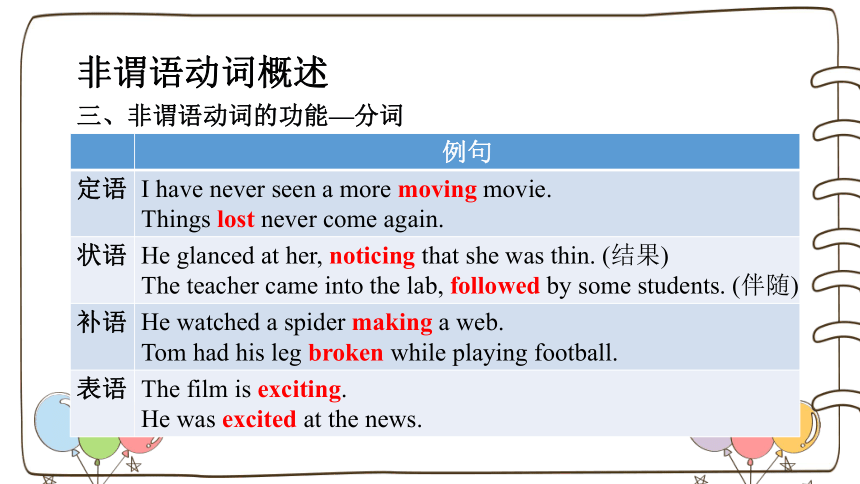

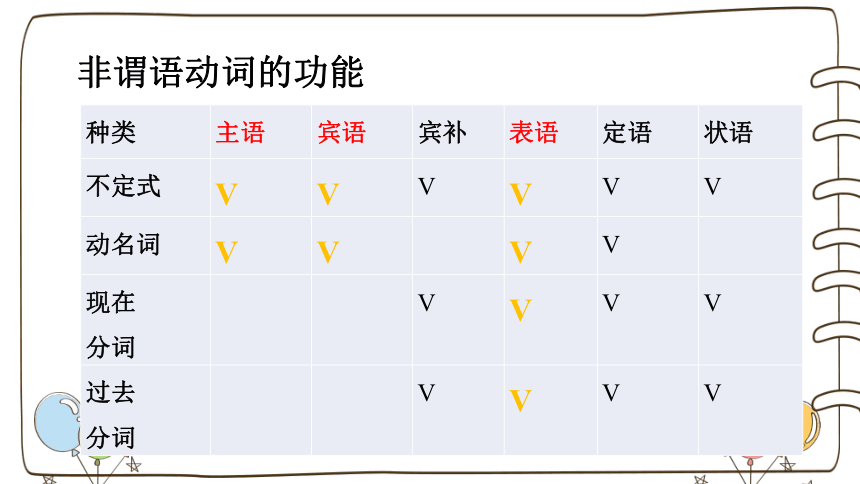
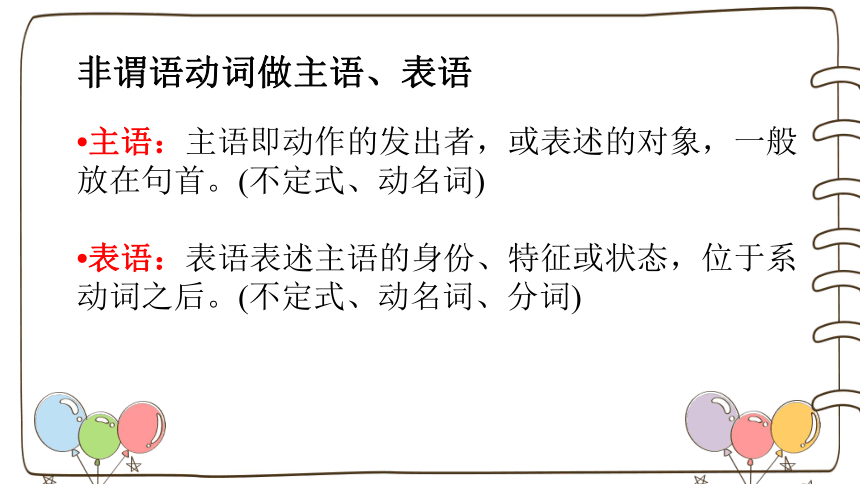
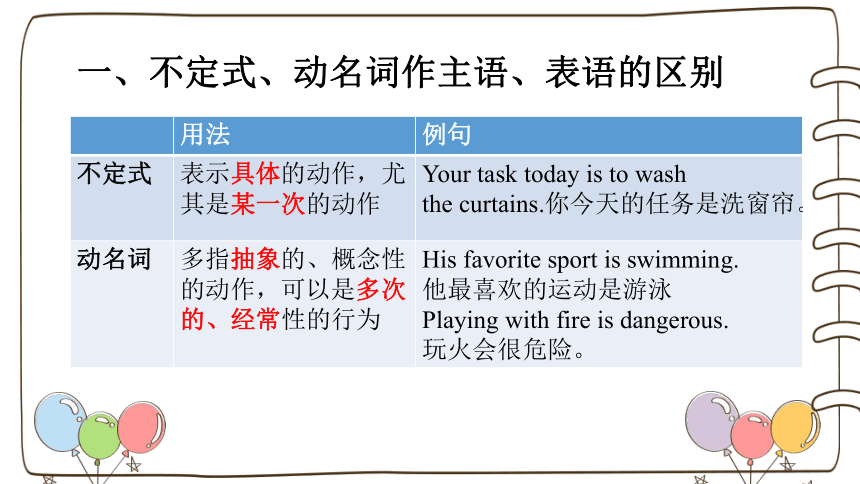
文档简介
(共37张PPT)
2
0
2
2
非谓语动词(1)
做主语、表语、宾语
非谓语动词概述
一个简单句只能有一个动词做谓语,这个动词叫谓语动词;在这个简单句中,其他没有做谓语的动词,不管有多少个,都不能做谓语,这些动词就叫非谓语动词。
形式:动词不定式to do ;动名词doing ;分词(现在分词doing , 过去分词done)
功能:谓语动词作谓语,非谓语动词作除谓语以外的成分,主宾表定状补。
非谓语动词概述
一、非谓语动词的形式—不定式(注意省略了to的情况)
种类 时态 主动语态 被动语态
不定式 一般式(将来) to do to be done
进行式(同时) to be doing X
完成式(完成) to have done to have been done
完成进行式(发生在过去, 持续到现在, 有可能继续持续下去) to have been doing X
否定式:以上形式前加not。
非谓语动词概述
一、非谓语动词的功能—不定式(注意省略了to的情况)
例句
主语 It is kind of you to help me.
宾语 They decided to change their mind.
宾语补足语 He helps the little girl to finish her homework every day.
定语 He is always the first to come and the last to leave.
表语 Our plan is to set up another middle school for the children.
状语 Every morning he gets up very early to exercise.
非谓语动词概述
二、非谓语动词的形式—动名词
种类 时态 主动语态 被动语态
动名词 一般式 doing being done
完成式 having done having been done
否定式:以上形式前加not。
非谓语动词概述
二、非谓语动词的功能—动名词
例句
主语 Talking is easier than doing.
My opening the door annoyed him.
宾语 He enjoys swimming in summer.
He is fond of swimming in summer.
表语 My job/hobby is painting.
Seeing is believing.
定语 There is a swimming pool in our school.(功能,用途)
动名词作定语:表功能。可转化为n.+for+动名词。
Eg. sleeping pills
现在分词作定语:可理解为adj.,表属性、特征,可转为定从。
Eg. a moving film
非谓语动词概述
三、非谓语动词的形式—分词
种类 时态 主动语态 被动语态
现在 分词 一般式 doing being done
完成式 having done having been done
过去 分词 一般式 X done
否定式:以上形式前加not。
非谓语动词概述
三、非谓语动词的功能—分词
例句
定语 I have never seen a more moving movie.
Things lost never come again.
状语 He glanced at her, noticing that she was thin. (结果)
The teacher came into the lab, followed by some students. (伴随)
补语 He watched a spider making a web.
Tom had his leg broken while playing football.
表语 The film is exciting.
He was excited at the news.
非谓语动词
做主语, 表语
非谓语动词的功能
种类 主语 宾语 宾补 表语 定语 状语
不定式 V V V V V V
动名词 V V V V
现在 分词 V V V V
过去 分词 V V V V
非谓语动词做主语、表语
主语:主语即动作的发出者,或表述的对象,一般放在句首。(不定式、动名词)
表语:表语表述主语的身份、特征或状态,位于系动词之后。(不定式、动名词、分词)
一、不定式、动名词作主语、表语的区别
用法 例句
不定式 表示具体的动作,尤 其是某一次的动作 Your task today is to wash
the curtains.你今天的任务是洗窗帘。
动名词 多指抽象的、概念性 的动作,可以是多次 的、经常性的行为 His favorite sport is swimming.
他最喜欢的运动是游泳
Playing with fire is dangerous.
玩火会很危险。
二、下列句型中常用动名词作主语
no use/good
not any use/good
It is/was of little use/good +doing sth.
worth
Eg. It is worth making an appointment before you go.
去之前预约一下是值得的。
三、下列句型中常用不定式作主语
It+be+名词+to do sth.
It takes/took sb.+some time+to do sth.
It+be+difficult/easy/important/impossible /necessary...+for sb. to do sth. It+be+careless/clever/foolish/honest/kind/lazy/silly/stupid/wise...+of sb.+to do sth.
三、下列句型中常用不定式作主语
It's our duty to take good care of the old.
照顾好老人是我们的责任。
How long did it take you to finish the work
你花了多长时间完成这项工作的?
It is difficult for us to finish writing the composition in an hour.我们难以在一小时内完成这篇作文。
It is stupid of you to write down everything (that) the teacher says.你把老师说的所有东西都记下来是很愚蠢的。
四、现在分词与过去分词作表语的区别
类别 用法 例句
现在分词 表特征,意为“令 人……的” The film is exciting.
这部电影激动人心。
过去分词 表心理状态,意为 “(人)感到 的” He was excited at the news.听到这则消息,他激动不已。
五、非谓语动词作remain的表语
1. 主语+remain+doing/done 仍然是(remain=be still)
She remained standing(=was still standing) though we repeatedly asked her to sit down.
虽然我们三番五次地请她坐下,但她还是站着。
The true author of the book remains unknown(=is still unknown).
这本书真正的作者依然不详。
五、非谓语动词作remain的表语
2. 主语+remain+to be done 仍需被做
Much remains to be done.
许多事仍需去做
技巧点拨
非谓语动词作主语、表语
句型
判断法
功能
判断法
根据句型,对号入座
作表语
作主语
“感到…的”-done
“令人…的”-doing
具体、某一次:to do
抽象、习惯性:doing
找逻主,
辨主被,
分先后。
练习:非谓语做主语、表语
1. These days, it is not unusual for 10-to-12-year-old to publish their own websites or for second and third graders ____________ (begin) computer classes.
2. Above all, I have come to understand that________(bring) happiness to others is getting ourselves happiness.
3._______(send) yellow roses can be risky, as they represent either friendship or envy.
4. It is________(shock) that some investment banks even judge candidates by whether they wear brown shoes.
5. No matter how bright a talker you are,there are times when it's better ______ ( remain ) silent.
to begin
bringing
Sending
shocking
to remain
非谓语动词
做宾语
非谓语动词作宾语
宾语:宾语是动作、行为的对象,一般位于及物动词或介词之后。
非谓语动词做宾语:句子的宾语部分由非谓语动词构成。
结构:1. 主语+谓语+to do/doing
2. 介词+doing/being done
考点1:v.+to do
此外,afford, strive, happen(碰巧),wait, threaten等也要用不定式作宾语。
决心学会想希望 decide/determine, learn, want, expect/hope/wish
拒绝设法愿假装 refuse, manage, care, pretend
主动答应选计划 offer, promise, choose, plan
同意请求帮一帮 agree, ask/beg, help
考点2:v.+doing
考虑建议盼原谅 consider, suggest/advise, look forward to, excuse, pardon
承认推迟没得想 admit, delay/put off, fancy(想象,设想)
避免错过继续练 avoid, miss, keep/keep on, practice
否认完成就欣赏 deny, finish, enjoy/appreciate
禁止想象才冒险 forbid, imagine, risk
不禁介意准逃亡 can't help, mind, allow/permit, escape
考点2:v.+doing
注意:allow, permit, forbid, advise, consider后需加动名词作宾语,但如果后面有名词或代词作宾语,则用不定式作宾补。
allow
permit
forbid +
advise
consider
doing sth.
(动名词作宾语)
sb. to do sth.
(不定式作宾补)
have(no/much/some/...) difficulty/trouble/a hard time(in),
take pleasure in 喜欢做某事
spend time/money (in)
waste time(in) 浪费时间做
be worth 值得做
be busy 忙于做
feel like 想要做某事
be committed to 致力于
考点2:v.+doing
考点3:v.+to do/doing
意义差别大:
①forget to do sth. 忘记要去做某事(此事未做)
forget doing sth. 忘记做过某事(此事已做过或已发生)
remember to do sth. 记得去做某事(未做)
remember doing sth. 记得做过某事(已做)
②stop to do 停止(某件事), 目的是去做另一件事
stop doing 停止正在或经常做事
go on to do 继续(去做另外一件事情)
go on doing 继续(原先没有做完的事情)
考点3:v.+to do/doing
③regret to do sth. 对要做的事感到遗憾(遗憾地要去做某事)
regret doing sth. 对过去做过的事或未做过的事感到后悔(后悔做过或未做过某事)
④try to do 努力、企图做
try doing 试验、试一试某种办法
⑤mean to do (人)打算, 有意要……
mean doing (物)意味着
⑥can't help to do sth. 不能帮助做某事
can't help doing sth. 情不自禁做某事
忘记停止,
继续努力,
意味着不后悔。
考点4:prep.+doing/being done
Eg. My grandpa said last summer they earned quite a lot by selling the fish.
They did all this without being paid.
考点4:prep. to固定搭配
to既可以作介词,又可以作不定式符号,因此要牢记含介词to的常用短语。含介词to的常用短语:
be used to(习惯于) be accustomed to(习惯于)
be opposed to(反对) object to(反对)
lead to(导致) be devoted to(献身于)
come close to(差点) stick to(坚持,坚守)
get down to(开始) pay attention to(注意)
reduce sb./sth. to(使沦落)
考点4:prep. to固定搭配
He is used to getting up early.
他习惯了很早起床。
Heart failure can sometimes lead to being killed.
心力衰竭有时可能会导致死亡。
I was so angry that I came close to hitting him.
我如此生气以至于差点儿打他。
He was reduced to begging in the streets.
他沦落到沿街乞讨。
考点5:need, want, require
need, want, require即可以用动名词也可用不定式作宾语,但用法不同。
sth. need(s)/want(s)/require(s) doing(主动形式表被动意义)
sth. need(s)/want(s)/require(s) to be done.
Eg. The window needs cleaning/to be cleaned.
这扇窗户需要擦一下。
sb. need(s) to do sth. Eg. He needs to leave at once.
sb. want(s) to do sth. Eg. David wants to play basketball.
考点5:need, want, require
He is used to getting up early.
他习惯了很早起床。
Heart failure can sometimes lead to being killed.
心力衰竭有时可能会导致死亡。
I was so angry that I came close to hitting him.
我如此生气以至于差点儿打他。
He was reduced to begging in the streets.
他沦落到沿街乞讨。
考点6:deserve, be worth, be worthy (of)
deserve+
deserve, be worth, be worthy (of)即可以用动名词,也可以用不定式作宾语,但用法不同。
doing
to be done
be worthy+
to be done
of being done
be worth doing (主动形式表被动意义)
The place is worth visiting.
=The place is worthy to be visited.
=The place is worthy of being visited. 这个地方值得参观。
考点7:前有do,后无to
We could do nothing but wait.
=We had nothing to do but wait.
我们除了等待,什么也做不了。
2. We had no choice but to wait.
我们除了等待,别无选择。
动词不定式在连词but后面时,如果连词之前有行为动词do的某种形式,那么连词后的不定式不带to,否则就要带to。
技巧点拨
非谓语动词作宾语
作介词宾语
只接不定式作宾语的动词后
to do
只接动名词作宾语的动词后
doing
接不定式和动名词作宾语意义不同
非谓语动词先于谓语动词发生:doing
非谓语动词后于谓语动词发生:to do
doing
注意“to”的身份识别
动名词作宾语,主动形式表被动意义
want/need/require/deserve/be worth
练习:非谓语作宾语
1. Scientists have responded by ____________(note) that hungry bears may he congregating(聚集) around human settlements.
2. I still remember ____________ (visit) a friend who'd lived here for five years and I was shocked when I learned she hadn’t cooked once in all that time.
3. Once his message was delivered, he allowed me_________(stay) and watch.
4. Isn’t it time you get down to ____________(mark) the papers
5. We have to admit____________(make) a serious error before, for we are far behind at present.
6. Any country can’t escape ____________(punish) if it attempts to destroy the interests of other countries.
noting
visiting
to stay
marking
having made
being punished
种类 时态 主动语态 被动语态
动名词 一般式 doing being done
完成式 having done having been done
2
0
2
2
非谓语动词(1)
做主语、表语、宾语
非谓语动词概述
一个简单句只能有一个动词做谓语,这个动词叫谓语动词;在这个简单句中,其他没有做谓语的动词,不管有多少个,都不能做谓语,这些动词就叫非谓语动词。
形式:动词不定式to do ;动名词doing ;分词(现在分词doing , 过去分词done)
功能:谓语动词作谓语,非谓语动词作除谓语以外的成分,主宾表定状补。
非谓语动词概述
一、非谓语动词的形式—不定式(注意省略了to的情况)
种类 时态 主动语态 被动语态
不定式 一般式(将来) to do to be done
进行式(同时) to be doing X
完成式(完成) to have done to have been done
完成进行式(发生在过去, 持续到现在, 有可能继续持续下去) to have been doing X
否定式:以上形式前加not。
非谓语动词概述
一、非谓语动词的功能—不定式(注意省略了to的情况)
例句
主语 It is kind of you to help me.
宾语 They decided to change their mind.
宾语补足语 He helps the little girl to finish her homework every day.
定语 He is always the first to come and the last to leave.
表语 Our plan is to set up another middle school for the children.
状语 Every morning he gets up very early to exercise.
非谓语动词概述
二、非谓语动词的形式—动名词
种类 时态 主动语态 被动语态
动名词 一般式 doing being done
完成式 having done having been done
否定式:以上形式前加not。
非谓语动词概述
二、非谓语动词的功能—动名词
例句
主语 Talking is easier than doing.
My opening the door annoyed him.
宾语 He enjoys swimming in summer.
He is fond of swimming in summer.
表语 My job/hobby is painting.
Seeing is believing.
定语 There is a swimming pool in our school.(功能,用途)
动名词作定语:表功能。可转化为n.+for+动名词。
Eg. sleeping pills
现在分词作定语:可理解为adj.,表属性、特征,可转为定从。
Eg. a moving film
非谓语动词概述
三、非谓语动词的形式—分词
种类 时态 主动语态 被动语态
现在 分词 一般式 doing being done
完成式 having done having been done
过去 分词 一般式 X done
否定式:以上形式前加not。
非谓语动词概述
三、非谓语动词的功能—分词
例句
定语 I have never seen a more moving movie.
Things lost never come again.
状语 He glanced at her, noticing that she was thin. (结果)
The teacher came into the lab, followed by some students. (伴随)
补语 He watched a spider making a web.
Tom had his leg broken while playing football.
表语 The film is exciting.
He was excited at the news.
非谓语动词
做主语, 表语
非谓语动词的功能
种类 主语 宾语 宾补 表语 定语 状语
不定式 V V V V V V
动名词 V V V V
现在 分词 V V V V
过去 分词 V V V V
非谓语动词做主语、表语
主语:主语即动作的发出者,或表述的对象,一般放在句首。(不定式、动名词)
表语:表语表述主语的身份、特征或状态,位于系动词之后。(不定式、动名词、分词)
一、不定式、动名词作主语、表语的区别
用法 例句
不定式 表示具体的动作,尤 其是某一次的动作 Your task today is to wash
the curtains.你今天的任务是洗窗帘。
动名词 多指抽象的、概念性 的动作,可以是多次 的、经常性的行为 His favorite sport is swimming.
他最喜欢的运动是游泳
Playing with fire is dangerous.
玩火会很危险。
二、下列句型中常用动名词作主语
no use/good
not any use/good
It is/was of little use/good +doing sth.
worth
Eg. It is worth making an appointment before you go.
去之前预约一下是值得的。
三、下列句型中常用不定式作主语
It+be+名词+to do sth.
It takes/took sb.+some time+to do sth.
It+be+difficult/easy/important/impossible /necessary...+for sb. to do sth. It+be+careless/clever/foolish/honest/kind/lazy/silly/stupid/wise...+of sb.+to do sth.
三、下列句型中常用不定式作主语
It's our duty to take good care of the old.
照顾好老人是我们的责任。
How long did it take you to finish the work
你花了多长时间完成这项工作的?
It is difficult for us to finish writing the composition in an hour.我们难以在一小时内完成这篇作文。
It is stupid of you to write down everything (that) the teacher says.你把老师说的所有东西都记下来是很愚蠢的。
四、现在分词与过去分词作表语的区别
类别 用法 例句
现在分词 表特征,意为“令 人……的” The film is exciting.
这部电影激动人心。
过去分词 表心理状态,意为 “(人)感到 的” He was excited at the news.听到这则消息,他激动不已。
五、非谓语动词作remain的表语
1. 主语+remain+doing/done 仍然是(remain=be still)
She remained standing(=was still standing) though we repeatedly asked her to sit down.
虽然我们三番五次地请她坐下,但她还是站着。
The true author of the book remains unknown(=is still unknown).
这本书真正的作者依然不详。
五、非谓语动词作remain的表语
2. 主语+remain+to be done 仍需被做
Much remains to be done.
许多事仍需去做
技巧点拨
非谓语动词作主语、表语
句型
判断法
功能
判断法
根据句型,对号入座
作表语
作主语
“感到…的”-done
“令人…的”-doing
具体、某一次:to do
抽象、习惯性:doing
找逻主,
辨主被,
分先后。
练习:非谓语做主语、表语
1. These days, it is not unusual for 10-to-12-year-old to publish their own websites or for second and third graders ____________ (begin) computer classes.
2. Above all, I have come to understand that________(bring) happiness to others is getting ourselves happiness.
3._______(send) yellow roses can be risky, as they represent either friendship or envy.
4. It is________(shock) that some investment banks even judge candidates by whether they wear brown shoes.
5. No matter how bright a talker you are,there are times when it's better ______ ( remain ) silent.
to begin
bringing
Sending
shocking
to remain
非谓语动词
做宾语
非谓语动词作宾语
宾语:宾语是动作、行为的对象,一般位于及物动词或介词之后。
非谓语动词做宾语:句子的宾语部分由非谓语动词构成。
结构:1. 主语+谓语+to do/doing
2. 介词+doing/being done
考点1:v.+to do
此外,afford, strive, happen(碰巧),wait, threaten等也要用不定式作宾语。
决心学会想希望 decide/determine, learn, want, expect/hope/wish
拒绝设法愿假装 refuse, manage, care, pretend
主动答应选计划 offer, promise, choose, plan
同意请求帮一帮 agree, ask/beg, help
考点2:v.+doing
考虑建议盼原谅 consider, suggest/advise, look forward to, excuse, pardon
承认推迟没得想 admit, delay/put off, fancy(想象,设想)
避免错过继续练 avoid, miss, keep/keep on, practice
否认完成就欣赏 deny, finish, enjoy/appreciate
禁止想象才冒险 forbid, imagine, risk
不禁介意准逃亡 can't help, mind, allow/permit, escape
考点2:v.+doing
注意:allow, permit, forbid, advise, consider后需加动名词作宾语,但如果后面有名词或代词作宾语,则用不定式作宾补。
allow
permit
forbid +
advise
consider
doing sth.
(动名词作宾语)
sb. to do sth.
(不定式作宾补)
have(no/much/some/...) difficulty/trouble/a hard time(in),
take pleasure in 喜欢做某事
spend time/money (in)
waste time(in) 浪费时间做
be worth 值得做
be busy 忙于做
feel like 想要做某事
be committed to 致力于
考点2:v.+doing
考点3:v.+to do/doing
意义差别大:
①forget to do sth. 忘记要去做某事(此事未做)
forget doing sth. 忘记做过某事(此事已做过或已发生)
remember to do sth. 记得去做某事(未做)
remember doing sth. 记得做过某事(已做)
②stop to do 停止(某件事), 目的是去做另一件事
stop doing 停止正在或经常做事
go on to do 继续(去做另外一件事情)
go on doing 继续(原先没有做完的事情)
考点3:v.+to do/doing
③regret to do sth. 对要做的事感到遗憾(遗憾地要去做某事)
regret doing sth. 对过去做过的事或未做过的事感到后悔(后悔做过或未做过某事)
④try to do 努力、企图做
try doing 试验、试一试某种办法
⑤mean to do (人)打算, 有意要……
mean doing (物)意味着
⑥can't help to do sth. 不能帮助做某事
can't help doing sth. 情不自禁做某事
忘记停止,
继续努力,
意味着不后悔。
考点4:prep.+doing/being done
Eg. My grandpa said last summer they earned quite a lot by selling the fish.
They did all this without being paid.
考点4:prep. to固定搭配
to既可以作介词,又可以作不定式符号,因此要牢记含介词to的常用短语。含介词to的常用短语:
be used to(习惯于) be accustomed to(习惯于)
be opposed to(反对) object to(反对)
lead to(导致) be devoted to(献身于)
come close to(差点) stick to(坚持,坚守)
get down to(开始) pay attention to(注意)
reduce sb./sth. to(使沦落)
考点4:prep. to固定搭配
He is used to getting up early.
他习惯了很早起床。
Heart failure can sometimes lead to being killed.
心力衰竭有时可能会导致死亡。
I was so angry that I came close to hitting him.
我如此生气以至于差点儿打他。
He was reduced to begging in the streets.
他沦落到沿街乞讨。
考点5:need, want, require
need, want, require即可以用动名词也可用不定式作宾语,但用法不同。
sth. need(s)/want(s)/require(s) doing(主动形式表被动意义)
sth. need(s)/want(s)/require(s) to be done.
Eg. The window needs cleaning/to be cleaned.
这扇窗户需要擦一下。
sb. need(s) to do sth. Eg. He needs to leave at once.
sb. want(s) to do sth. Eg. David wants to play basketball.
考点5:need, want, require
He is used to getting up early.
他习惯了很早起床。
Heart failure can sometimes lead to being killed.
心力衰竭有时可能会导致死亡。
I was so angry that I came close to hitting him.
我如此生气以至于差点儿打他。
He was reduced to begging in the streets.
他沦落到沿街乞讨。
考点6:deserve, be worth, be worthy (of)
deserve+
deserve, be worth, be worthy (of)即可以用动名词,也可以用不定式作宾语,但用法不同。
doing
to be done
be worthy+
to be done
of being done
be worth doing (主动形式表被动意义)
The place is worth visiting.
=The place is worthy to be visited.
=The place is worthy of being visited. 这个地方值得参观。
考点7:前有do,后无to
We could do nothing but wait.
=We had nothing to do but wait.
我们除了等待,什么也做不了。
2. We had no choice but to wait.
我们除了等待,别无选择。
动词不定式在连词but后面时,如果连词之前有行为动词do的某种形式,那么连词后的不定式不带to,否则就要带to。
技巧点拨
非谓语动词作宾语
作介词宾语
只接不定式作宾语的动词后
to do
只接动名词作宾语的动词后
doing
接不定式和动名词作宾语意义不同
非谓语动词先于谓语动词发生:doing
非谓语动词后于谓语动词发生:to do
doing
注意“to”的身份识别
动名词作宾语,主动形式表被动意义
want/need/require/deserve/be worth
练习:非谓语作宾语
1. Scientists have responded by ____________(note) that hungry bears may he congregating(聚集) around human settlements.
2. I still remember ____________ (visit) a friend who'd lived here for five years and I was shocked when I learned she hadn’t cooked once in all that time.
3. Once his message was delivered, he allowed me_________(stay) and watch.
4. Isn’t it time you get down to ____________(mark) the papers
5. We have to admit____________(make) a serious error before, for we are far behind at present.
6. Any country can’t escape ____________(punish) if it attempts to destroy the interests of other countries.
noting
visiting
to stay
marking
having made
being punished
种类 时态 主动语态 被动语态
动名词 一般式 doing being done
完成式 having done having been done
